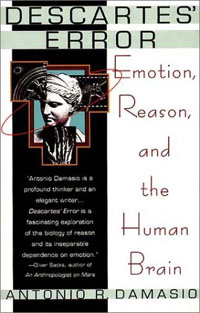Contrary to traditional scientific opinion, feelings are just as cognitive as other percepts. They are the result of a most curious physiological arrangement that has turned the brain into the body’s captive audience. Feelings let us catch a glimpse of the organism in full biological swing, a reflection of the mechanism of life itself as they go about their business. Were it not for the possibility of sensing body states that are inherently ordained to be painful or pleasurable, there would be no suffering or bliss, no longing or mercy, no tragedy or glory in the human condition.
-Antonio R. Damasio in Descartes’ Error

Descartes’ error, as meant by neurologist Antonio R. Damasio in this book, and one that has insinuated itself deeply into mainstream thought, is as he puts it: “the abyssal separation between body and mind, between the sizable, dimensioned, mechanically operated, infinitely divisible body stuff, on the one hand, and the unsizable, undimensioned, un-pushpullable, nondivisible mind stuff; the suggestion that reasoning, and moral judgment, and the suffering that comes from physical pain or emotional upheaval might exist separately from the body. Specifically: the separation of the most refined operations of mind from the structure and operation of a biological organism.”
In other words: thinking is inescapably a biological process. It is expressly not true, as many people take for granted, that “thinking, and awareness of thinking, are the real substrates of being.”
